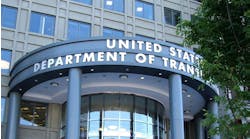The American Trucking Assns. has reiterated its call for the Federal Motor Carrier Safety Administration to immediately establish a process to remove from motor carriers’ records crashes where it was plainly evident that the carrier was not to blame.
ATA pointed to several examples of such crashes that have occurred over the past year, including:
- A high-speed police chase that ended with fatal collision on I-40 in Amarillo, TX.
- A suspected drunk driver that rear-ended a gasoline tanker in Los Angeles.
- A Southington, CT, incident when a police pursuit of stolen SUV ended in a fiery tanker truck crash.
“Just last month, police gave chase to a driver of a stolen car who crossed a grassy median and struck a truck head-on,” said Bill Graves, ATA president & CEO. “It is clearly inappropriate for FMCSA to use these types of crashes to prioritize trucking companies for future government intervention, especially when responsibility for the crash is so obvious.”
Currently, carriers’ scores in FMCSA’s safety monitoring system, Compliance, Safety, Accountability, are based on all carrier-involved crashes, including those that the companies’ drivers did not cause and could not reasonably have prevented.
“Including these types of crashes in the calculation of carriers’ CSA scores, paints an inappropriate picture for shippers and others that these companies are somehow unsafe,” Graves said.
Last week, FMCSA’s Motor Carrier Safety Advisory Committee heard from a crash reconstructionist who contended that FMCSA could not determine fault in many instances based solely on information from police accident reports.
“This may be the case with some crashes,” said Graves, “but not when a drunk driver rear ends a gasoline tanker or the driver of a stolen car crosses a grassy median and strikes a truck head on.”
Over a year ago, FMCSA shelved plans to make just these sorts of determinations in favor of further study. ATA subsequently called on FMCSA to establish an interim process to address crashes where it is “plainly evident” that the crash should not count against the trucking company.
“FMCSA has been evaluating this issue for years and is not due to complete additional research until this summer,” Graves said. “We don’t need more research to conclude that it is inappropriate to use crashes like these to paint the involved trucking companies and professional drivers as unsafe.”


